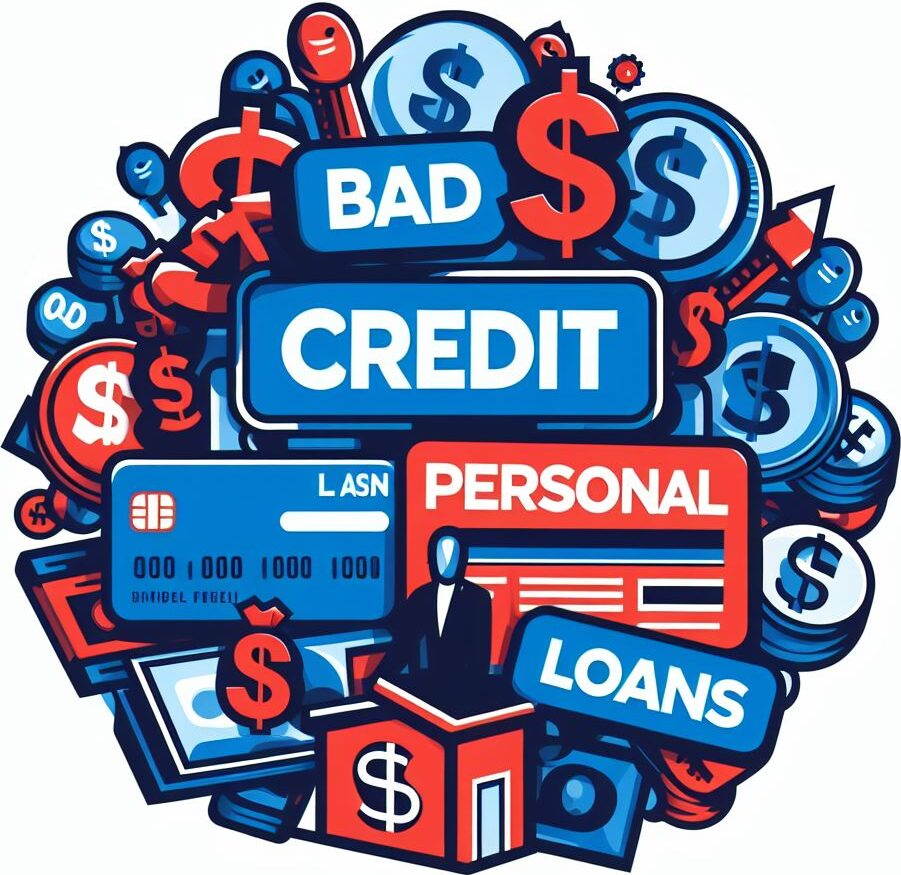So, you’re interested in getting a personal loan, but you’re worried your credit score might hold you back. I’m going to walk you through what bad credit really means in the eyes of lenders and how it impacts your ability to secure a personal loan.
At its core, bad credit is a term used to describe a low credit score. Different models measure your creditworthiness, but for the FICO score, which is widely used, bad credit is generally considered a score below 580. Your credit score is calculated based on factors like your payment history, the amount of debt you carry, and how long you’ve been managing credit.

You’re going to find out about the tough road ahead when seeking loans with poor credit, as lenders often view you as a higher risk. This could lead to higher interest rates or even outright denials of your loan applications. However, knowing the lay of the land can help you approach this with realistic expectations.
And it’s not just about the score. Secured vs. unsecured personal loans can also come into play. A secured loan requires collateral, which could improve your odds of approval. An unsecured loan, on the other hand, doesn’t require collateral but might come with even steeper terms given your credit score.
If you’re already feeling a bit overwhelmed, don’t worry too much. Next up, I’m here to help you with practical steps to prepare your application for a bad credit personal loan. We’ll look into checking your credit report, taking steps to pump up that credit score, and wrapping your head around the concept of borrowing within your means.
Preparing to Apply for a Bad Credit Personal Loan
Ready to take the next step? Great. I’m going to show you how to set up the stage for your bad credit personal loan application. Keep in mind; this isn’t just about snatching up the first opportunity you find. It’s about preparation, fortifying your financial background, and making sure you stand the best chances despite your credit score.
First up, get ahold of your credit report. You’re entitled to a free report annually from the major credit bureaus. This isn’t just busy work; it’s vital to understand your current standing and spot any errors that might be pulling your score down.
Your credit score might need a boost before you apply, and that can include paying down existing debt where possible, catching up on late payments, or disputing credit report inaccuracies. These actions can sometimes make a significant difference in your credit score.
Now, before you charge ahead into getting a loan, stop and draft a budget. This is like drawing a map for your financial journey. Figure out how much you can realistically pay each month. This helps you avoid overborrowing, which can lead to more financial strain.
Document-wise, lenders are going to need proof of your income, employment, and identity. Make sure you have items like your government-issued ID, pay slips, and tax returns. Being organized can make the application process smoother and quicker.
Up next, in ‘Finding the Right Lender for Your Needs,’ I’ll walk you through evaluating potential lenders and comparing offers. This part is critical – you want a trustworthy lender who’ll give you a fair shake, even with your less-than-stellar credit.
Finding the Right Lender for Your Needs
I’m going to give you some tips on where and how to look for lenders that might approve you despite having bad credit. You’ll find there are quite a few options beyond the traditional big banks that might not be so keen on lending to those with less-than-stellar credit profiles.
Start by considering credit unions. They are member-owned and often more flexible with loan terms, especially if you’re already a member. Online lenders, on the other hand, might offer more competitive rates for bad credit loans, and they usually simplify the application process.
Don’t forget to vet any lender. Read reviews, check their standing with the Better Business Bureau, and look for any history of complaints. After all, it’s not just about getting a loan; it’s also about entering a deal that won’t make your financial situation worse.
Interest rates, fees, and terms can vary wildly when you have bad credit. That’s why it’s essential to compare these factors carefully. Some lenders may offer lower interest rates but charge hefty fees, while others might extend more favorable terms in exchange for a slightly higher rate.
Lastly, pre-qualification can be a game-changer. It lets you see potential loan terms without a hard inquiry on your credit report. Pre-qualification uses a soft pull, which doesn’t affect your credit score—crucial when every point matters for your credit health.
Navigating the Application and Repayment Process
I’m going to walk you through finalizing your personal loan when you have bad credit. By the time we’re done, you’ll have a solid grasp on what to expect and how to handle the repayment to better your financial situation for the future.
Your first step in the application process should be to gather all necessary documents. You’re going to find out about the importance of having recent pay stubs, tax returns, and identification documents ready.
Don’t worry too much about getting denied; it can happen. If you face rejection, it’s crucial to understand why. Lenders are required to provide an explanation, so use this information to improve your chances next time.
You can always adjust your approach down the road, but having a strategy for repayment from the outset is key. Choose something that resonates with you, whether that’s setting up automatic payments or scheduling payment reminders.
There’s a lot of opportunity in consistent, on-time payments. They can significantly boost your credit score over time, demonstrating to lenders that you’re a responsible borrower, which could help with securing more favorable loan terms in the future.
In my opinion, staying on top of your loan repayment is not just about keeping your credit score healthy; it’s also about financial peace of mind. So, my question to you today is, ‘Are you ready to commit to this financial step?’
I really hope that you follow these steps to effectively navigate your personal loan journey. Remember, your first attempt doesn’t need to be your last – you’re building a foundation for stronger financial health. Patience, discipline, and informed decisions will be your best allies here.
Thanks for taking this journey with me. I’d love to hear how these strategies work out for you, and I’m here to help with any further questions you have. Good luck with your loan, and here’s to a healthier financial future!

Jeff’s guide on securing a personal loan with bad credit is a beacon of hope for those feeling trapped by their financial history. He demystifies the process, emphasizing preparation and realistic expectations. His advice on checking credit reports and boosting scores before applying is particularly valuable, highlighting actions individuals can often overlook. Jeff’s encouragement to explore credit unions and online lenders opens up avenues many may not consider. This article doesn’t just offer steps to secure a loan; it provides a roadmap to better financial health. It’s clear, concise, and crucial reading for anyone in this situation.
Thank you so much for your insightful comment, Kyle! I’m thrilled to hear that my guide on securing a personal loan with bad credit resonated with you and provided a sense of hope and empowerment. It’s truly gratifying to know that my emphasis on preparation, setting realistic expectations, and taking proactive steps has been valuable in demystifying the process for individuals in challenging financial situations.
I agree that checking credit reports and taking actions to boost credit scores are essential steps that individuals often overlook, but they can make a significant difference in their financial journey. By highlighting these often neglected actions, I aimed to provide practical tools for improving financial health.
Additionally, suggesting alternative options such as credit unions and online lenders reflects my belief in exploring diverse avenues for financial support. These alternatives can offer opportunities that individuals may not have considered initially, expanding their possibilities for securing a loan.
Ultimately, my goal with the article was not only to provide steps for securing a loan but also to offer a comprehensive roadmap to better financial health. I’m glad to hear that you found the guide clear, concise, and crucial for anyone facing similar challenges. Thank you for recognizing the value of my work, and I hope it continues to empower and guide others on their financial journey. #FinancialHealth #PersonalFinance #CreditScore #Empowerment
Jeff